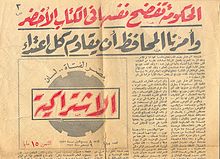User:FloorBAISME/sandbox
Relationship with nationalism
[edit]The press has been used as a medium of expression.[1] The press played an important role during the rise of nationalism in the Middle East.[1] As a participant in political debates, the press sometimes got repressed by the regimes and in other times benefited from the political transformation as it gave them the freedom to debate.[1][2] For the national regimes, the press was a way to communicate to the people and form a new cultural identity.[1]
After the first world war, the Ottoman empire disintegrated, Egypt was occupied by the British and new political rules had to be implanted where the press played a big part in.[3][2] The Western ideas and institutions that formed the previous political community undermined the traditional Islamic ideology that used to be the political community before the British occupation.[4] The anti British feelings and demand for British withdraw was a thriving topic amongst political leaders in the Middle East.[2] The newspapers would often publish political debates and opinions and thereby enhancing public interests.[2] Plus, with the rapid technological developments, the press developed quickly.[2] After Egypt gained independence from Britain in 1922, the political leaders started their own news papers, discussing issues such as the search for a national/cultural identity, opposing British domination and conflicts within and among other political parties.[2] A new political system had to be created whereby a combination of the traditional Islamic ideology had to be readjust.[4] Therefore, the dynamic press became an open forum for national and political issues.[2]

Language standardization
[edit]With the rise of new foreign ideas, linguistic change appeared during the development of the press.[5][2][6] The growing nationalist movement challenged the journalist to adapt the language to a broader audience.[5][2][6] To propagate a national ideology, a negotiation over language standardization was necessary to reach all.[5][2][6] It had a big effect on the transmission of ideas and knowledge as the public level of literacy rose and had the desire to consume news.[1] For the public, the language standardization created a sense of belonging to the nation.[7] They could express their identity in the social, cultural and political aspects of the press.[1]
References
[edit]- ^ a b c d e f The press in the Middle East and North Africa, 1850-1950 : politics, social history and culture. Anthony Gorman, Didier Monciaud. Edinburgh. 2018. ISBN 978-1-4744-4480-4. OCLC 1055758044.
{{cite book}}: CS1 maint: location missing publisher (link) CS1 maint: others (link) - ^ a b c d e f g h i j Ayalon, Ami (1995). The press in the Arab Middle East : a history. Merkaz Dayan le-ḥeḳer ha-Mizraḥ ha-Tikhon ṿe-Afriḳah. New York: Oxford University Press. ISBN 978-0-19-535857-5. OCLC 72566372.
- ^ McDougall, James (November 2020). "The Emergence of Nationalism". The Oxford Handbook of Contemporary Middle Eastern and North African History – via Oxford Handbooks Online.
- ^ a b Smith, Charles D. (1973). "The 'Crisis of Orientation': The Shift of Egyptian Intellectuals to Islamic Subjects in the 1930's". International Journal of Middle East Studies. 4 (4): 382–410. ISSN 0020-7438.
- ^ a b c Booth, Marilyn (August 1992). "Colloquial Arabic Poetry, Politics, and the Press in Modern Egypt". International Journal of Middle East Studies. 24 (3): 419–440. doi:10.1017/S0020743800021966. ISSN 0020-7438.
- ^ a b c Armbrust, Walter (29 January 2009). "The Formation of National Culture in Egypt in the Interwar Period: Cultural Trajectories". History Compass. 7 (1): 155–180.
- ^ Anderson, Benedict R. O'G. (2016). Imagined communities : reflections on the origin and spread of nationalism (Revised ed.). London. ISBN 978-1-78478-675-5. OCLC 932385849.
{{cite book}}: CS1 maint: location missing publisher (link)

